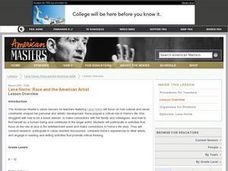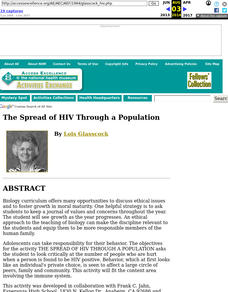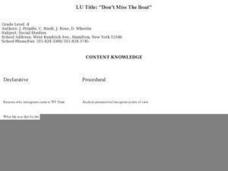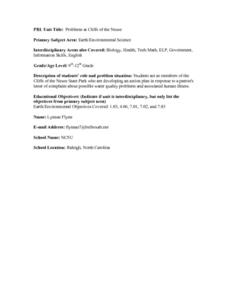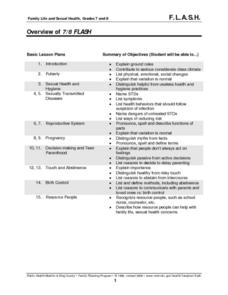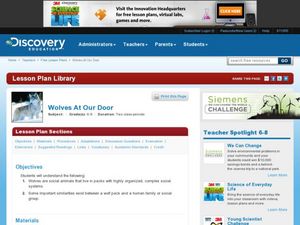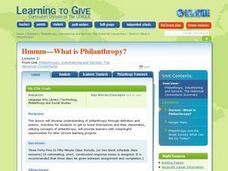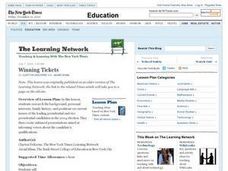Curated OER
Democracy in Action: Everyday Farmers
Students experiment with a situation as if they were farmers in a co-op. In this democratic decision making lesson plan, students role-play as farmers that are members of a co-op and a have a serious decision to make about spreading...
Curated OER
Lena Horne: Race and the American Artist
Students examine how race played a critical role in Lena Horne's life. They conduct Internet research, participate in a class debate, write a letter, and create a presentation based on their Internet research.
Curated OER
Travel Agencies
Students explore the job responsibilities of a travel agent. In this career activity, students discuss and role-play specific details of what a travel agent must do at the beginning of the day prior to opening.
Curated OER
The Spread of HIV Through a Population
Students use a model to illustrate the spread of HIV through an adolescent population and, acting in the role of epidemiologists, explore the dilemmas of HIV infection presented by the simulation. beneficence and justice.
Curated OER
Don't Miss The Boat
Fourth graders study immigration and what it is like to be an immigrant. They choose immigrant identities, dress appropriately, and role play during an International Fair where each student displays some aspect of his/her "home country."
Curated OER
Problems at Cliffs of the Neuse
Students assume the roles of members of the Cliffs of the Neuse Sate Park and must develop an action plan in response to a complaint about possible water quality problems and associated human illnesses. Students conduct research on the...
Curated OER
Muslim Women Through Time
Students examine the culture and stereotypes of Muslim women and discover a combination of items have affected the role of Muslim women as a group and individually over time. Groups research a famous Muslim woman, present their...
Curated OER
WALK A MILE IN MY SHOES
Students explore educational opportunities available to people living in a variety of developing and more economically developed countries. They work in groups and research an assigned country and explore how society values education,...
Curated OER
The Teenage Single Parent
Students examine the challenges a single teenage parent faces. In groups, they research ways to positively cope with an unplanned pregnancy and design their own layette for their new baby. As a class, they discuss what it means to be...
Curated OER
FLASH
Students Distinguish among assertive, aggressive, passive and manipulative behaviors,Describe consequences of each,Formulate an assertive request,Describe how it feels to risk rejection. Students Describe how human immunodeficiency virus...
Curated OER
Language Arts/Science: Genetic Diseases Simulation
Eighth graders engage inn role-playing activities as families caring for babies with genetic defects. A partial list of activities include: dressing the babies ( raw eggs), designing birth certificates, and recording a log of care,...
Curated OER
Wolves At Our Door
Students investigate the wolf. In this animal adaptation lesson, students examine the social characteristics of the wolf. They discuss the role of human intervention in reestablishing the wolf population.
Curated OER
Hmmm-What is Philanthropy?
Learners develop an understanding of philanthropy through definition and actions. Students to get to know themselves and their classmates by engaging in activities imbedded in this lesson. They investigate the types of philanthropic...
Curated OER
History: Napoleon Becomes a Man of Destiny
Students analyze the forces that shape character development, including the role of historical events. Students contrast the ethos of the Ancient Regime with the new ideals awakened by the French Revolution.
Curated OER
Giving Beyond Measure-- Diary of Anne Frank
Young scholars examine the philanthropic concepts and values in the play, "The Diary of Anne Frank." They read the play, role-play characters, create a poster, and write journal entries.
Curated OER
Winning Tickets
Students research background, personal interests, family history, and positions on current issues of the leading presidential and vice presidential candidates. They create unbiased presentations aimed at informing voters about...
Curated OER
When Johnny Went Marching Off...
Eighth graders decide whether to join the Union or Confederate army. Then decide under which General you serve and in which battles you fight. Finally students create civilwar documents in assigned roles.
Curated OER
Coming to America
Fifth graders listen to the song America by Neil Diamond, view pictures of Ellis Island, and role play as processing officers who evaluate, classify and recommend which immigrants can stay in America.
Curated OER
The American Mosaic
Eighth graders role play as a poor immigrant family moving from the Old World to the New World in search of the American Dream. They create a portfolio and journal of their travels.
Curated OER
A Little Horse Sense
How have horses evolved over time? How do horse skulls reveal this evolution? How have the roles horses play changed over time? What kind of social structure do horse herds have? How should wild horse populations be managed? To find the...
Curated OER
Willie and Friends: Overcomers in the Land Stories by Faith Ringgold
Young scholars use puppets and plays to examine the role of African Americans throughout history. After being read a story by a puppet, they respond to each one in writing. Individually, they write a story about a place they have wanted...
Curated OER
Stella the Swan
Students analyze the telling of a story with props. They study similarities and differences between ducks, geese and swans, how wildfowl are adapted to life in water, how wildfowl move and feed, and wildfowl family life, how they nest,...
Curated OER
Good Diet, Fad Diet
Students play a role of a registered dietician to examine low carbohydrate diets and diets currently on the market and compare them to a balanced diet. They determine a strategy for weight loss for a patient that meets specifications...
Curated OER
Pendemonium: the Ink on the Sphinx
Learners review the forms of nouns through a fanciful video and picture book discussion. They attempt to tell a story about their family without using nouns and then create a noun pyramid of common. proper, plural, and irregular nouns...

